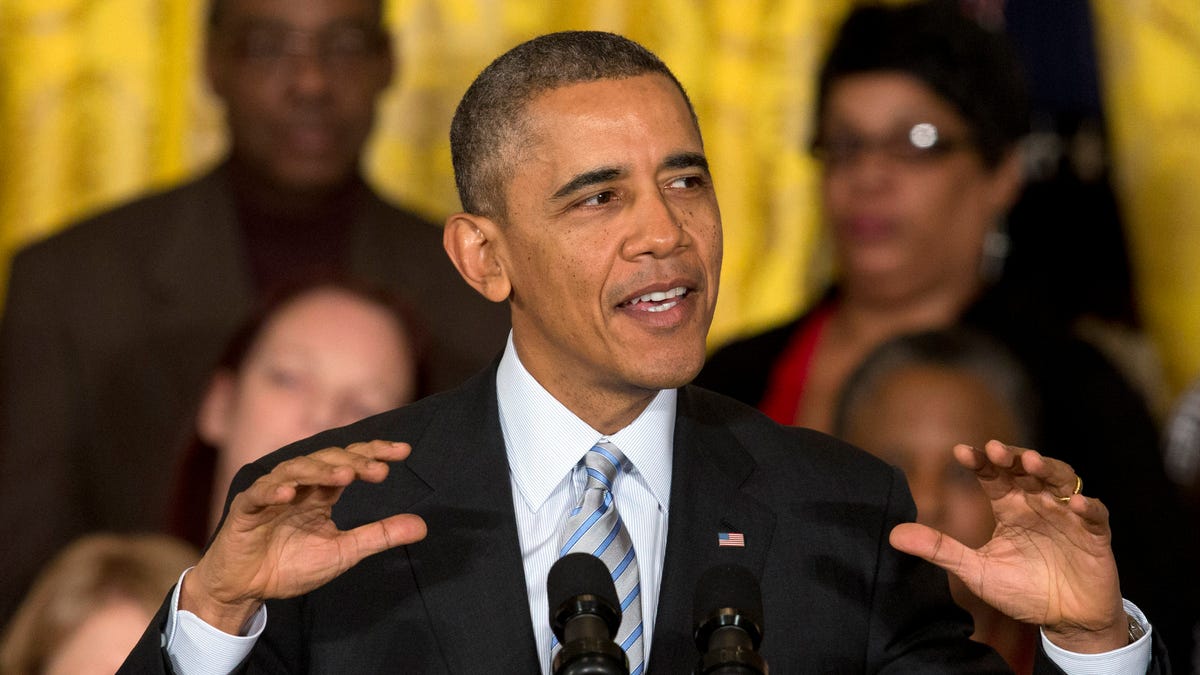
Feb. 12, 2014 President Obama speaks in the East Room of the White House.
WASHINGTON – President Barack Obama is asking Congress for $300 billion to update roads and railways, arguing the taxpayer investment will help put Americans to work.
Obama was announcing the proposal Wednesday at the Union Depot rail and bus station in St. Paul, Minn., after touring a light rail maintenance facility. Funding for surface transportation programs expires later this year, and the White House says 700,000 jobs could be at risk unless it is renewed.
Transportation Secretary Anthony Foxx warned Wednesday of a "transportation cliff coming in August or September" when the Highway Trust Fund, which finances federal highway and transit projects, is forecast to go broke.
The trust fund, which finances federal highway and transit programs, will need an influx of $100 billion over the next six years just to maintain current transportation spending levels. But Obama and Congress have been unwilling to raise federal gas and diesel taxes that have been the main source of federal transportation funding for decades.
Obama is proposing that half of the $302 billion he's seeking come from an overhaul of corporate taxes, but says he's open to other ideas.
Separately Wednesday, Rep. Dave Camp, R-Mich., chairman of the tax-writing House Ways and Means Committee, announced a corporate tax overhaul plan that would dedicate $126.5 billion in corporate tax revenue to the Highway Trust Fund over the next eight years.
Obama was stressing the job-creating power of federal transportation projects. As part of his promise to take executive action where Congress won't, the president also planned to announce a $600 million competition for federal grants to pay for infrastructure projects that create jobs.
The Highway Trust Fund has paid for federal transportation projects dating to the early years of construction of the interstate highway system more than 50 years ago. The primary sources of revenue for the fund are the federal 18.4 cent-per-gallon gasoline and 24.4 cent-per-gallon diesel taxes, which haven't been increased in 20 years. The cost of highway construction has risen over the decades, while revenue going into fund has declined. Among the reasons for the decline are that vehicles are getting better gas mileage and people are driving less on a per capita basis.
The fund experienced its first shortfall, in which there wasn't enough money in the account to pay for promised transportation aid to states, in 2008. Since then, Congress has shifted tens of billions of dollars from the general treasury to make up continuing shortfalls. Some of these transfers have been paid for through spending cuts or tax increases elsewhere in the federal budget, while others have not.
Earlier this month, the nonpartisan Congressional Budget Office estimated that the trust fund again will not have enough money to meet its obligations to states by the end of the federal budget year on Sept. 30.
Even if Congress transfers enough money into the fund to keep transportation aid flowing, it's generally acknowledged that current spending levels aren't enough to keep up with repair and replacement of the nation's aging infrastructure. Three blue-ribbon commissions have called for raising the gas tax and indexing it to inflation. But congressional leaders and the White House have shied away from a fuel tax increase, considered a politically dangerous move.




